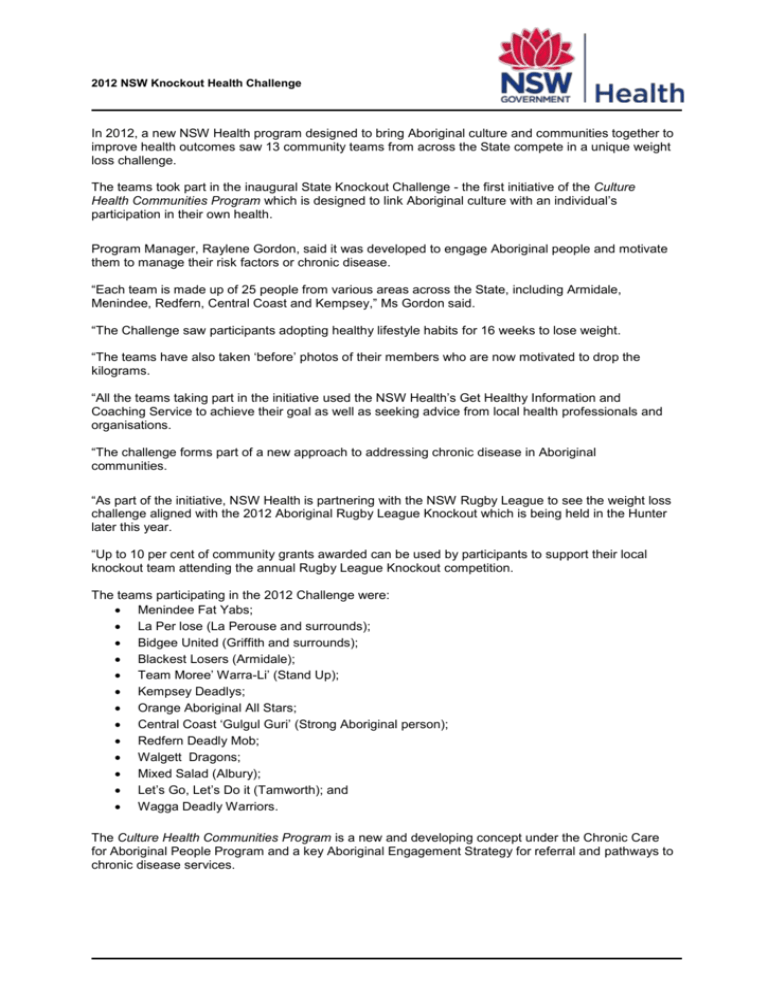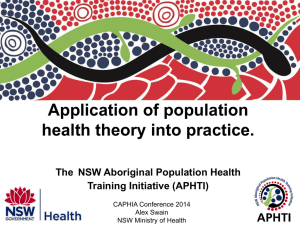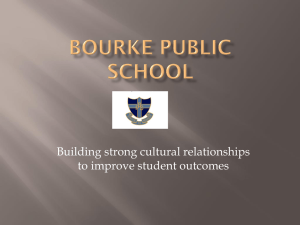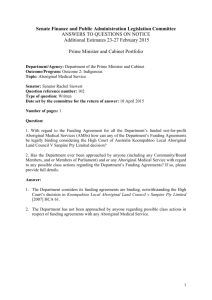2012 NSW Knockout Health Challenge In 2012, a new NSW Health
advertisement

2012 NSW Knockout Health Challenge In 2012, a new NSW Health program designed to bring Aboriginal culture and communities together to improve health outcomes saw 13 community teams from across the State compete in a unique weight loss challenge. The teams took part in the inaugural State Knockout Challenge - the first initiative of the Culture Health Communities Program which is designed to link Aboriginal culture with an individual’s participation in their own health. Program Manager, Raylene Gordon, said it was developed to engage Aboriginal people and motivate them to manage their risk factors or chronic disease. “Each team is made up of 25 people from various areas across the State, including Armidale, Menindee, Redfern, Central Coast and Kempsey,” Ms Gordon said. “The Challenge saw participants adopting healthy lifestyle habits for 16 weeks to lose weight. “The teams have also taken ‘before’ photos of their members who are now motivated to drop the kilograms. “All the teams taking part in the initiative used the NSW Health’s Get Healthy Information and Coaching Service to achieve their goal as well as seeking advice from local health professionals and organisations. “The challenge forms part of a new approach to addressing chronic disease in Aboriginal communities. “As part of the initiative, NSW Health is partnering with the NSW Rugby League to see the weight loss challenge aligned with the 2012 Aboriginal Rugby League Knockout which is being held in the Hunter later this year. “Up to 10 per cent of community grants awarded can be used by participants to support their local knockout team attending the annual Rugby League Knockout competition. The teams participating in the 2012 Challenge were: Menindee Fat Yabs; La Per lose (La Perouse and surrounds); Bidgee United (Griffith and surrounds); Blackest Losers (Armidale); Team Moree’ Warra-Li’ (Stand Up); Kempsey Deadlys; Orange Aboriginal All Stars; Central Coast ‘Gulgul Guri’ (Strong Aboriginal person); Redfern Deadly Mob; Walgett Dragons; Mixed Salad (Albury); Let’s Go, Let’s Do it (Tamworth); and Wagga Deadly Warriors. The Culture Health Communities Program is a new and developing concept under the Chronic Care for Aboriginal People Program and a key Aboriginal Engagement Strategy for referral and pathways to chronic disease services. Representatives from each team met at Rugby League Central on June 21 to discuss ways of training groups of people and tools and exercises which can be used to help people lose weight. It was a great day during which teams met the competition and shared ideas on how to help their communities. “There is plenty of laughter at training and it’s wonderful to see the younger members motivating the older members. Congratulations to the teams for their innovative approaches to training and rewarding success.” “Mums are getting fitter to keep up with their kids and a number of people have reduced or stopped taking medications for blood pressure and diabetes. These are the great results we were after!” Each team has brought their unique edge to training and keeping motivated to lose weight and develop healthy lifestyles. We have seen some great results with people losing many centimetres from their waists. To keep themselves motivated Armidale Team The Blackest Losers organised a visit from former Biggest Loser contestant Sharif Deen, who shared his weight loss experience. Albury team Mixed Salad enjoyed a performance and talk from Christine Anu who has recently lost weight and changed her lifestyle. Bidgee United from Griffith have had visits from NRL players to motivate their team while the Orange Aboriginal All Stars have great Sunday afternoon sessions at the PCYC with a great healthy meal afterwards. The team results were calculated using the total percentage of weight loss of the top 20 participants from each team. The community grants available for the first, second and third placed teams were $70,000, $20,000 and $10,000 respectively, to be used for community health promotion activities. Menindee came first, with the top 20 participants losing a collective 12.0% of body weight (270.5 kg). La Perouse was second, with the top 20 participants losing a collective 10.2% (227 kg). Griffith was third, with the top 20 participants losing a collective 5.4% (111.3 kg). The first placed female and male participants lost 22.0% and 21.5% of their body weight respectively. Over 1100 kgs were lost by all program participants. The total number of participants who completed the program by submitting their final weight was 239. Eight-nine percent of participants who completed the Challenge lost weight, with the total percentage weight loss across program completers being 4.7%. The average weight of program completers went from being 103.0 kg at the start of the Challenge to 98.1 kg at program completion. The average BMI of program completers went from being 37.3 kg/m 2 to 35.6 kg/m2. The average waist measurements for both males and females who completed the challenge went from 116cm to 110cm at program completion. Additional self-reported positive outcomes included dietary changes, increased exercise, and improved knowledge. Program Manager, Raylene Gordon said there have been some amazing individual and team results. “I congratulate everybody involved in this new and exciting initiative which engages Aboriginal communities to participate in their own health and outcomes.” “The top three teams are excited about receiving their community grants which will help promote healthy lifestyles and support the message of ‘Get a Check Up, Eat Right and Get Active’ in their local areas”, Ms Gordon said. “This challenge is about building healthy families. Mums are getting fitter to keep up with their kids. Children are training alongside their parents and Aunties and Uncles. “Not only is the State Knockout Challenge helping communities to lose weight, it is also supporting people to develop healthy lifestyle habits such as eating fruits and vegetables and healthy snacks as well as being physically active. PAGE 2 OF 3 “These habits help people to feel healthier and get more out of life. And, importantly, can prevent a range of chronic diseases such as heart disease, stroke and diabetes.” The winners were presented with the State Knockout Challenge Shield at the NSW Aboriginal Rugby League Knockout in Raymond Terrace on September 29. The program was independently evaluated by CIRCA Research. The evaluation indicated that the Challenge achieved its aim of encouraging weight loss among program participants and teams through physical activity and improved nutrition, and that the pilot program was highly effective. The evaluation also indicated that the Culture-Health-Communities framework is a feasible and appropriate model for this program. Importantly, outcomes of the Culture-Health-Communities model such as community connectedness, and physical and emotional well-being were demonstrated in the evaluation. The evaluation also identified opportunities for further enhancing this model in the future. Key recommendations include a longer initial start-up phase, the time of year (i.e. not winter), refining the roles and responsibilities of town committee members, greater engagement and support for the Challenge teams from the NSWRL, and enhancing the support provided to the teams by the MOH. Plans are underway for the 2013 Challenge which will incorporate the recommendations from the evaluation report. Contacts: Rachael Havrlant, Chronic Care for Aboriginal People Program, Agency for Clinical Innovation, ph: 02 9464 4688 email: Rachael.havrlant@aci.health.nsw.gov.au & Raylene Gordon, Program Manager, NSW Ministry of Health, ph: 0434 323 422 email: rgord@doh.health.nsw.gov.au PAGE 3 OF 3







